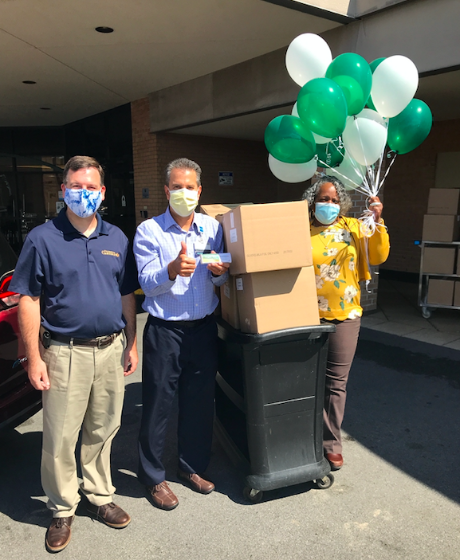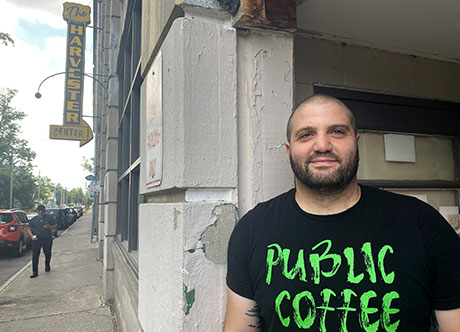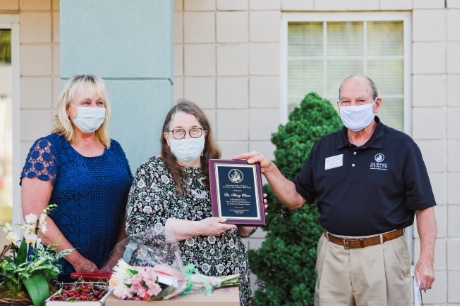Press release:
Standing at the Union Tavern restaurant in Irondequoit and on the heels of a successful five-week, short-term extension for the original Paycheck Protection Program (PPP), U.S. Senator Charles E. Schumer unveiled the Prioritized Paycheck Protection Program Act, or "P4" Act, which seeks to provide additional relief for New York’s smallest businesses that have been severely impacted by the economic effects of the COVID-19 pandemic.
Schumer explained that his proposed legislation would provide much-needed relief to Rochester-Finger Lakes small business owners by extending the PPP loan period to the end of the year and providing the option for a second PPP loan for eligible small businesses that are in need of additional assistance to survive.
Specifically, "P4" second loans will allow for businesses to access funds worth 250 percent of monthly payroll costs, up to a maximum of $2 million. Small businesses and nonprofits with fewer than 100 employees, sole proprietors, independent contractors, self-employed borrowers, and rural and historically underserved communities will be eligible for this second round of assistance, in an effort to get critical federal aid to the most in-need businesses that have lost 50 percent or more of revenues due to the COVID-19 pandemic.
These second PPP loans would be fully forgivable similar to the first PPP loans as long as all requirements are met in the use of funds. Schumer said that the next stimulus package must target assistance to hard-hit Rochester-Finger Lakes small businesses like Union Tavern, and those in historically underserved communities.
Citing data from the New York State Department of Labor, Schumer further explained that the private sector job count in the Rochester-Finger Lakes region fell by 88,100 or 19 percent, to 374,500 during the 12-month period ending in May 2020.
”The PPP has been a lifeline for Rochester-Finger Lakes Region small businesses struggling to stay afloat during these turbulent times, and last week, I fought to ensure that the program would continue to support our hard-working New Yorkers for at least another month,” Senator Schumer said. “However, as New York seeks to recover from the crisis, we need to do even more for businesses hardest-hit by the pandemic.
"This legislation will bring much-needed changes to the existing PPP program to make loans more accessible to the smallest businesses and nonprofits in the Rochester-Finger Lakes Region that are struggling the most and make a second round of relief possible for businesses that need the extra support.”
The senator said that his "P4" legislation will reserve 20 percent of PPP funds for employers with 10 or fewer employees and ensure priority processing for such businesses and nonprofits, in conjunction with priority processing for underserved and rural borrowers across the Rochester-Finger Lakes region, including veterans. To further make sure that the funding is reserved for the hardest-hit small businesses, the "P4" loan will not be available to publicly traded companies.
Schumer noted that Rochester-Finger Lakes Region labor statistics show that for the 12-month period ending May 2020, the private sector job count in the Rochester metro area fell by 88,100, or 19.0 percent, to 374,500. Schumer explained that this data points to a critical need for federal support to revive the region’s economy, including aid to help small businesses weather the crisis and to put them on a road to recovery as the lynchpins of our communities.
Schumer was joined by leading Rochester-Finger Lakes region stakeholders including Melissa Marquez, CEO of the Genesee Co-op Federal Credit Union who share these sentiments and recognize the importance of this critical legislation for PPP reform that targets hurting businesses.
As one of the Rochester region’s few Community Development Financial Institution (CDFI) approved by the Federal Small Business Administration (SBA) to make PPP loans, Genesee co-op has assisted dozens of minority-owned small business secure a PPP but estimates they have only met 20 percent of the need that now exists among minority or un-banked small businesses in the Rochester region.
The Senator was also joined by Kelly Bush, co-owner of the Union Tavern and president of the Rochester Chapter of the NYS Restaurant Association, Mark Taylor, CEO of Apogee Exhibits in Macedon, which employs 25 workers and makes trade show displays and marketing materials for clients across the country, and Mark Cuddy Artistic Director of Geva Theatre Center.
They shared their firsthand experiences with the Paycheck Protection Program with Senator Schumer and joined him in his push for additional aid for hurting Rochester-Finger Lakes region businesses.
Kelly Bush, co-owner of the Union Tavern and President of the Rochester Chapter of the NYS Restaurant Association said, “As a small business owner facing a shuttered business in early March, securing a PPP was a game changer to help us survive through those first few months. But with realities still beyond our control and continued future uncertainties, enabling us to access a second PPP would be a lifeline for our business and countless others in the Rochester Finger Lakes region that cannot operate at regular capacity due to the pandemic. We appreciate Senator Schumer pushing this legislation to support of our industry so that small businesses can keep their doors open and employees on the job.”
Mark Taylor, CEO of Apogee Exhibits in Macedon, said, “We are part of the live events industry. An industry that contributes over 100 billion dollars to the economy when these events take place. When conventions and other events happen it sets into motion the work of countless small business owners, their employees, and sole proprietors. From carpenters and electricians and other trades, to hotels and hospitality, and other small businesses such as restaurants. All of these small businesses are crucial to restarting our economy, but they'll need additional help. We appreciate Senator Schumer for his advocacy of the small businesses of our economy and our nation."
Mark Cuddy, artistic director of Geva Theatre Center, said, “On March 12th Geva Theatre Center sold its last ticket as theaters closed down across the country. That means we have had zero ticket revenue for almost four months, and will not for the next 4-6 months. Even when a time comes for reopening we will be reduced in capacity to 35-40 percent of seats. We cannot survive in this model. Our 52 resident full-time staff and over a hundred guest artists cannot survive. Their families cannot survive. The restaurants and hotels who serve our patrons cannot survive. The PPP loan was a lifeline, and Senator Schumer’s Prioritized Paycheck Protection Program would be a remarkable ray of hope for our most vulnerable sectors.”
Details on the Prioritized Paycheck Protection Program Act, or "P4," appear below. "P4" loans:
- May be as large as 2.5-times monthly payroll costs, just as under initial PPP loans, but may not be any larger than $2 million. (Affiliated businesses with separate locations may pursue separate P4 loans, but in aggregate the loans may not exceed $2 million.)
Allow borrowers to apply for forgiveness as early as eight weeks after the loan is disbursed and they have fulfilled payroll requirements, rather than make them opt-in to eight weeks or wait until the earlier of 24 weeks or Dec. 31, which needlessly increases the cost of the loan as interest accrues, tying up money that could be deployed for paychecks.
- Are not available to publicly traded companies.
- Except as otherwise mentioned, are subject to the same terms, conditions, and forgiveness criteria as initial PPP loans.
- Provide lenders a minimum processing fee of $2,500 per P4 loan to ensure lenders do not lose money by processing small-dollar loans or cherry pick larger loans.
To increase access to PPP (initial and P4) assistance to underserved businesses, the bill reserves the lesser of $25 billion or 20 percent of PPP funds for employers with 10 or fewer employees, along with priority processing for such firms, harmonized with priority processing for underserved and rural borrowers.
The bill also requires SBA within five days to issue guidance, as required by the CARES Act, which instructs lenders to give priority in loan processing and disbursement to underserved and rural borrowers, including veterans. It also requires SBA to update the PPP loan application to collect demographic information on PPP recipients.







